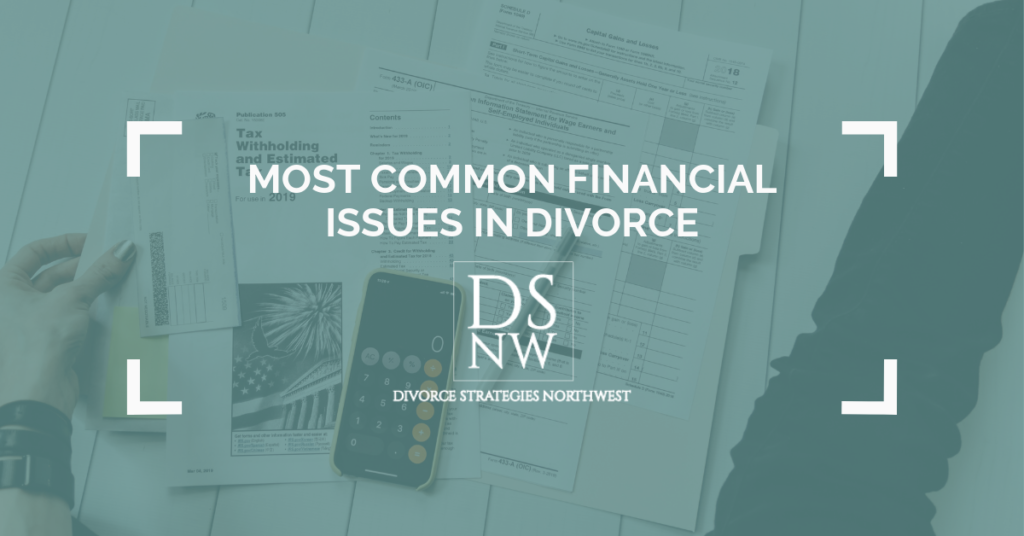In the event of a divorce, you and your spouse will need to make several decisions that will impact your financial future. If you have substantial assets that you wish to protect in your divorce, it is essential that you assemble and gain the advice of an expert divorce team. Your divorce team should include a realtor or mortgage broker, a CPA, a financial planner, and of course, a family law attorney. Sometimes, an expert in financial discovery, a forensic accountant, is needed but should be considered a last resort.
A number of financial experts and realtors are becoming certified in financial issues specific to divorce. This certificate designation is known as a certified divorce financial analyst, or CDFA for financial planners and Certified Divorce Real Estate expert or CDRE for realtors and real estate agents. These certifications are not absolutely necessary for a professional to hold in order to serve you well. However, those with the certification will be proactively looking for the advantages and pitfalls specific to divorcing people from day one.
Division of Property
The separation of property is one of the first decisions a divorcing couple needs to make.
Who gets the wine collection? Who gets the stock portfolio? The boat? How do you plan to split up the furniture?
The division of property can be decided between your spouse and you, or by court order, or by a combination of methods. The State of Washington is a community property state, meaning our laws stipulate that all assets acquired during a marriage are considered marital or joint assets. These assets, regardless of which spouse had purchased them during the marriage, are usually distributed equally to each spouse in a divorce.
Divorcing couples often come to a reasonable agreement between the two of them about the division of property, but should they become unable to reach an agreement about one or more items, there are some avenues they can take to reach a fair conclusion.
One common method is where one spouse takes certain items in exchange for others. Otherwise known as bartering. For example, the husband may take a car, the boat and the investment condo in exchange for the wife getting the primary home, all furniture and the second car. Another method used could be the sale of all marital property and then dividing the proceeds equally. Mediators or arbitrators may also be used to help map out these scenarios.
Division of Debt
Dividing and paying off debt is just as important as division of assets. It will be necessary for spouses to decide who will be responsible for which debts incurred during the course of the marriage. The first step is to discover and list all monies owed and to whom.
It is always a good idea to start with a credit report. Ordering your credit report will give you a snapshot of everything owed in your name, including joint accounts held with your spouse. Next, you will want to get the most current statements of mortgages, vehicle loans, leases, credit cards and any other creditor statements.
From this point forward, it is best to agree to stop incurring more debt while you are in the divorce process. Discuss with your attorney the need (if any) for temporary court orders to separate yourself from any new debt that may be incurred at this time by your spouse and vice versa. Cancelling joint credit cards and paying off the balance is often a good idea at this stage of the process.
Next, you will want to decide who will be responsible for which marital debt. Some methods for facilitating this include:
- Equal allocation of debt to both spouses. This method seems to be most equitable, but legally it can leave both spouses vulnerable. If an ex-spouse does not pay the debt that he/she is responsible for, the creditor will likely seek out the other spouse to pay up. This means, you may be responsible for paying a debt that your spouse has defaulted on –even if he or she agreed in writing to pay.
- Bartering debt in exchange for assets. One spouse may agree to take on the legal responsibility for all marital debts in exchange for receiving more assets from the division of property.
- Paying off most debts, if it is currently possible. Some divorcing spouses choose to pay off all debt immediately, by selling off assets or dipping into savings, in order to begin their new lives debt free. This is not always possible or reasonable, but if it is for you, this is the easiest, cleanest option.
Taxes and Divorce
Many people forget about issues around taxes during a divorce, but it can be one of the most costly aspects if not handled properly. Often times divorce attorneys will take a stab at allocating tax burdens between divorcing spouses, but divorce attorneys generally are not CPAs. Additionally, some of the marital assets that will be allocated between spouses will carry a tax burden that should be considered at the time of allocation. Do yourself a huge favor and get a seasoned CPA on your divorce team as early as possible.
“Many people forget about issues around taxes during a divorce, but it can be one of the most costly aspects if not handled properly.”
Tax issues to discuss may include:
- If I keep the primary home in the divorce but decide to sell it a year later, will I be hit with a larger tax bill than if I sold it while married?
- Who can claim which dependents?
- Are attorney fees tax deductible?
- If I liquidate a specific investment fund allocated to me to buy a new house, what will the tax burden look like?
- Can I claim Head of the Household status?
- Is child support tax deductible for the payer?
- What are the new tax laws around spousal support and how will that affect my settlement?
Hiring a CPA early in the game to identify and strategize your unique tax issues will likely save you a bundle and assure that your side of the divorce settlement remains balanced and fair.
Retirement Plans and Divorce
Each spouse is likely entitled to half of their partner’s retirement savings. The funds from retirement savings can be used toward covering current expenses, a down payment on a new home or for your own retirement. However certain uses of these funds will incur an early withdrawal tax penalty. Some people choose to give themselves a crash course on tax law in the hopes of figuring this out themselves. I do not recommend this. I say, ask the experts. Consult your CPA to discover the best use of your retirement funds, as well as other investment assets, with the least tax burden incurred.
Another important issue to consider with retirement savings is that, as a single person, your retirement needs will be larger as they are no longer shared with a spouse. Therefore, you will want to consider not only the equitable division of the assets but how much to contribute continually to your account(s) until you retire. This is where the advice of a Financial Planner (specifically a CDFA) will be very beneficial for you.
Know Your Family Finances
First, not everybody knows what is happening in their own marital finances. It is not uncommon for one spouse to have only part of the marital financial picture known to them. Others are completely “in the dark” about how much money is earned, spent, invested and owed at any given time. If this is you, please pay close attention to the following.
“Some people become the worst shadow of themselves in a divorce. People who are otherwise honest can become sneaky and secretive, especially when it comes to a financial declaration.”
Ask your spouse to share the details of the finances with you. If this is not possible, start opening the mail. Statements and bills that may be in the name of your spouse are legally yours as well. Revisit your last 3 years of tax returns to understand what your joint reported income was and which items were deducted. Do your best to become educated about your financial picture.
Some people become the worst shadow of themselves in a divorce. People who are otherwise honest can become sneaky and secretive, especially when it comes to a financial declaration. They may not be forthcoming about their true earnings, may omit or “forget” an investment asset, may ask their employer to delay their raise or bonus, some may even hide property in the name of a relative or friend. This is when a forensic accountant may be needed. Forensic accountants perform a very thorough and methodical investigation which may take months – and many billable hours. Again, a forensic accountant should be a last resort after you have done your best to find information on your own.
We’re here for you. For more information on finances and divorce, be sure to check out our News and Resources page regularly. And of course, if you need more help, contact us for a free consultation.





